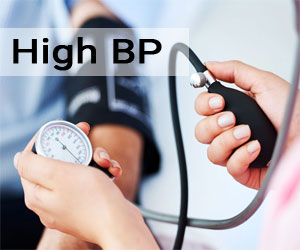- Home
- Editorial
- News
- Practice Guidelines
- Anesthesiology Guidelines
- Cancer Guidelines
- Cardiac Sciences Guidelines
- Critical Care Guidelines
- Dentistry Guidelines
- Dermatology Guidelines
- Diabetes and Endo Guidelines
- Diagnostics Guidelines
- ENT Guidelines
- Featured Practice Guidelines
- Gastroenterology Guidelines
- Geriatrics Guidelines
- Medicine Guidelines
- Nephrology Guidelines
- Neurosciences Guidelines
- Obs and Gynae Guidelines
- Ophthalmology Guidelines
- Orthopaedics Guidelines
- Paediatrics Guidelines
- Psychiatry Guidelines
- Pulmonology Guidelines
- Radiology Guidelines
- Surgery Guidelines
- Urology Guidelines
Treating High BP, cutting Sodium and Trans fats could save almost 100 million lives, finds study

Three very popular interventions, scaling up access to treatment of high blood pressure (BP), cutting down high sodium intake and eliminating intake of artificial trans fats could save lives of almost 100 million people, revealed a study published in Circulation, a journal published by American Heart society.
The results of the study showed that three well-known interventions, scaling up access to treatment of high blood pressure to 70%, reducing sodium intake by 30%, and eliminating the intake of artificial trans fatty acids, can delay 94 million deaths worldwide within 25 years.
The also reported that the projected impact of reducing sodium intake is as large as the impact of scaling up hypertension treatment to 70% and the 3 interventions combined may reduce disparities in global NCD mortality.
The purpose of the study was to quantify the global mortality impact of 3 interventions which are well documented to have the potential to minimize deaths due to cardiovascular diseases such as high blood pressure, heart attack, stroke and among others but a large portion of the population do not have access to this intervention.
The authors of the study used global data on mean blood pressure levels and sodium and trans fat intake by country, age, and sex from a pooled analysis of population health surveys, and regional estimates of current coverage of antihypertensive medications, and cause-specific mortality rates in each country, as well, with projections from 2015 to 2040. They have used the most recent meta-analyses of epidemiological studies to derive relative risk reductions for each intervention. They estimated the proportional effect of each intervention on reducing mortality from related causes by using a generalized version of the population-attributable fraction. The effect of antihypertensive medications and low sodium intake was modeled through their impact on blood pressure and as immediate increase/reduction to the proposed targets.
Key findings
- The combined effect of the 3 interventions delayed 94.3 million deaths during 25 years.
- Increasing coverage of antihypertensive medications to 70% alone would delay 39.4 million deaths, whereas lowering sodium intake by 30% would delay another 40.0 million deaths and eliminating trans fat would delay an additional 14.8 million.
- The estimated impact of trans fat elimination was largest in South Asia. SubSaharan Africa had the largest proportion of premature delayed deaths out of all delayed deaths.
Three effective interventions can save almost 100 million lives globally within 25 years. National and international efforts to scale up these interventions should be a focus of cardiovascular disease prevention programs, the authors concluded.
For further reference, please click on the link

Disclaimer: This site is primarily intended for healthcare professionals. Any content/information on this website does not replace the advice of medical and/or health professionals and should not be construed as medical/diagnostic advice/endorsement or prescription. Use of this site is subject to our terms of use, privacy policy, advertisement policy. © 2020 Minerva Medical Treatment Pvt Ltd